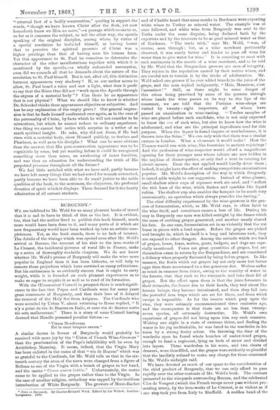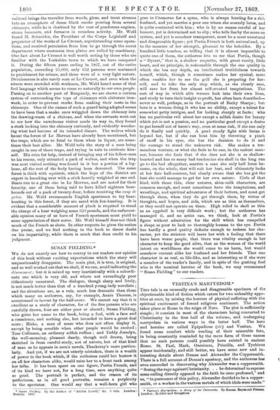BURGUNDY.*
WE are indebted to Mr. Weld for so many pleasant books of travel that it is sad to have to think of this as the last. It is evident, too, that had the author lived to publish this book himself, much more would have been done to it, and many parts of it which are now fragmentary would have been worked up into an artistic com- pleteness. Yet, as the book stands, there is no lack of interest. The details of the vintage which was opened soon after Mr. Weld's arrival at Beaune, the account of his visit to the iron-works of Le Creusot, the incidental pictures of rural life in France, make up a series of thoroughly readable chapters. We do not know whether Mr. Weld's praises of Burgundy will make the wine more popular in England than it has been hitherto, or will help to remove those prejudices which have survived so many refutations. But his enthusiasm is so evidently sincere that it ought to carry weight, while it is founded on such pleasant experiences as to make us eager to acquire it as well as to read of its formation.
With the (Ecumenical Council in prospect there is much signifi- cance in the fact that Popes and Cardinals were for many years great consumers of Burgundy, and that their love of it delayed the removal of the Holy See from Avignon. The Cardinals who were sounded by Urban V. about returning to Rome replied, "11 n'y a point de vin de Beaune en Italic, et sans yin de Beaune notTe vie sera malheureuse." There is a story of some Council having decreed that Moselle possessed peculiar virtues :—
" Vinnm Mosellanum
Est in omni tempore sannm."
A similar decree in favour of Burgundy would probably be received with more joy by the "Union of French Wine-Growers" than the proclamation of the Pope's infallibility will be even by Archbishop Manning. It seems, indeed, that the Virgin Mary has been enlisted in the cause of that "yin de Beaune" which was so grateful to the Cardinals, for Mr. Weld tells us that in the six- teenth century the arms of the town were changed from a figure of Bellona to one of the Virgin with a bunch of grapes in her hand, and the motto " Causa nest re hutitim." Unfortunately, the motto came to be applied to the grapes rather than to the Virgin. In the case of another religion, orthodoxy was sapped by the insidious introduction of White Burgundy. The growers of Mont-Rachet
• Notes on Burgundy. By Charles Richard Weld. Edited by his Widow. London: Longraans. 1869.
and of Chablis heard that some monks in Bordeaux were exporting white wines to Turkey as mineral water. The example was at once followed, and white wine from Burgundy was sent to the Turks under the same disguise, being declared both by the exporters and by the receivers to be as good mineral water as that of Bordeaux. "The trade trick," says Mr. Weld, "was, of course, seen through ; but, as a wine merchant pertinently observed, it was surely better and kinder to pass off wine for water than to give water for wine." It is consoling to meet with such sentiments in the mouth of a wine merchant, and to be told by Mr. Weld that the Burgundian growers are men of integrity. They rejoice in the reputation earned by their native wines, and are careful not to tarnish it by the tricks of adulteration. Mr. Weld asked one grower if he ever added brandy,to the juice of the grape, and the man replied indignantly, " Mais, Monsieur, c'est l'assassiner ! " Still, as there might be some danger of this crime being practised by some of the persons through whose hands the wine passes on its way to the lips of the consumer, we are told that the Parisian wine-shops are visited by twenty - eight inspectors, all of whom have passed an examination in wine-tasting. "Twelve samples of wine are placed before each candidate, who is not only expected to know the cru of each wine, but also to know how the wine is adulterated, and what are the principal ingredients used for this purpose. When the liquor is found impure or unwholesome, it is thrown into the Seine." We can only wish that there was a similar custom in London. What a clearance it would make ! How the Thames would run with wine, like fountains in ancient rejoicing& ! And the profession of wine-inspector would afford a magnificent opening for those younger sons whose talents are now bidden in the napkins of dinner-parties, or only find a vent in catering for circuit messes. Even the test applied would hardly deter them ; indeed, it might have the effect of making competitive examinations popular. Mr. Weld's description of the way in which Burgundy is tasted adds weight to our suggestion. Instead of wine-glasses, small shallow silver cups of repousse work are used, and "reflect the rich hues of the wine, which flashes and sparkles like liquid rubies. The shallow cup also enables the bouquet to be smelt very conveniently, an operation which always precedes the tasting."
The chief difficulty experienced by the wine-growers is the pro- cess of fermentation, which, as Mr. Weld says, is often fatal to the wine itself, and sometimes causes a loss of life. During his stay in Burgundy one man was killed outright by the fumes which the mass of seething grapes generated, and another nearly shared his fate. In one case, fermentation set in so violently that the vat burst in pieces with a loud report. Before the grapes are picked and brought in, which in itself is a long and laborious task, they are exposed to other dangers. Among the animals which are fond of grapes, boars, foxes, wolves, goats, badgers, and dogs are espe- cially mentioned. Foxes eat great quantities of grapes, but are themselves eaten in return by the Burgandians, and are considered a delicacy when properly flavoured by being fed on grapes. In like manner, the fowls which eat grapes lay not only more but better eggs than those accustomed to a less generous diet. Wolves suffer so much in summer from thirst, owing to the scarcity of water in the forests, that they rush to the vineyards and take their fill of grapes. But the effect upon them is that the juice ferments in their stomachs, the fumes rise to their heads, they reel about like human beings, they become intoxicated, and then they fall into the powerful iron traps which are set for them, and from which escape is impossible. As for the insects which prey upon the vine, they were solemnly excommunicated three centuries ago, and the consequence is that there are no less than twenty- seven species, all extremely destructive. Mr. Weld's own experience of grapes did not bring upon him any such censures. Waking one night in a state of extreme thirst, and finding the water in his jug undrinkable, he was lured to the wardrobe in his room by a strong fruity odour. On throwing the door of the wardrobe open he found whole bunches of amber-hued grapes, enough to feast a regiment, lying on beds of straw and divided into layers. Three wardrobes in his room, and two chests of drawers, were thus filled, and the grapes were evidently so plentiful that the landlady refused to make any charge for those consumed in Mr. Weld's midnight raid.
We have devoted so much of our space to the consideration of the chief product of Burgundy, that we can only afford to pass rapidly over the other contents of Mr. Weld's book. The contrast presented to the vineyards surrounding Beaune, and the celebrated Clos de Vougeot (which the French troops never pass without pre-, senting arms), by the iron-works of Le Creusot, is as violent as if one step took you from Italy to Sheffield. A sudden bend of the
railroad brings the traveller from woods, glens, and trout streams into an atmosphere of dense black smoke pouring from several chimneys, while he is deafened by the roar of ponderous engines, steam hammers, and furnaces in ceaseless activity. Mr. Weld found M. Schneider, the President of the Corps Legislatif and proprietor of the works of Le Creusot, superintending some opera- tions, and received permission from him to go through the secret department where enormous iron plates are rolled by machinery. One fact about Le Creusot is well worth noting by those who are familiar with the Yorkshire town to which we have compared it. During the fifteen years ending in 1867, out of the entire population, exceeding 25,000, only 632 persons were sentenced to punishment for crimes, and those were of a very light nature. Drunkenness is also rarely seen at Le Creusot, and even when the streets were crowded with workmen, Mr. Weld heard none of that foul language which seems to come so naturally to our own people. Passing on to another part of Burgundy, we are shown a curious system of surrounding the tops of chimneys with elaborate iron- work, in order to prevent storks from making their nests in the chimneys. One of the causes of such a guard being adopted seems to have been that a snake once wriggled down the chimney into the drawing-room of a château, and when the servants went out to see how the unwelcome visitor made its way in, they found a stork looking into the chimney curiously, and evidently wonder- ing what had become of its intended dinner. The wolves which haunt the forest of Le Morvan have already been mentioned, but the traps, which are so fatal to them when in liquor, are some- times their best allies. Mr. Weld tells the story of a man being caught in one of these traps, and trying in vain to extricate him- self. His cries for help, instead of bringing any of his fellow-men to his rescue, only attracted a pack of wolves, and when the trap was next visited nothing was found in it but a portion of a leg- bone, all the rest of the body having been devoured. The same forest is thick with squirrels, which the boys of the district are expert in knocking over with a stick heavily weighted at one end. Boars run to a great size in Le Morvan, and are noted for their ferocity, one of them being said to have killed eighteen boar- hounds out of a pack of twenty-four, before receiving the coup de grace. Mr. Weld recommends English sportsmen to try boar- hunting in this forest, if they are sated with fox-hunting. It is evident that a considerable amount of pluck is required to stand the charge of a boar weighing some 350 pounds, and the unfavour- able opinion many of us have of French sportsmen must yield to some appreciation of their nerve. Mr. Weld himself does not think much of the French as shots. In other respects he gives the nation due praise, and we find nothing in the book to throw doubt on his impartiality, while there is much that does credit to his judgment.



































 Previous page
Previous page